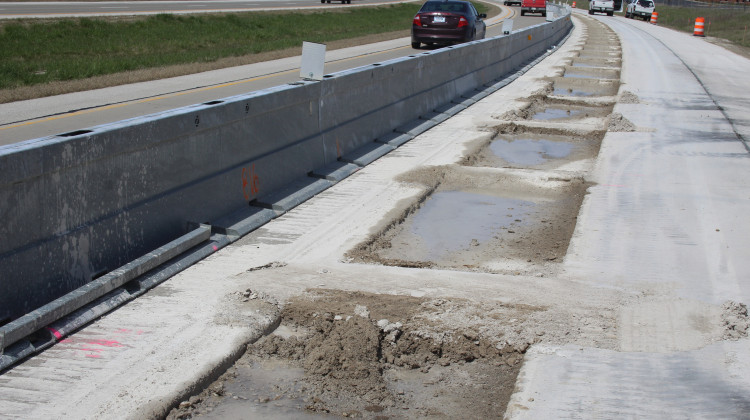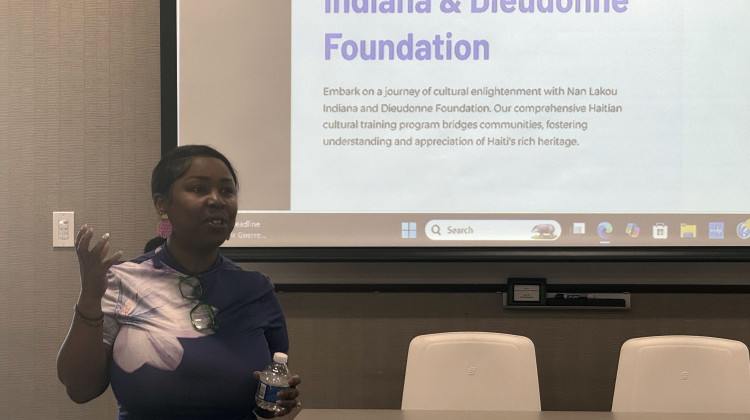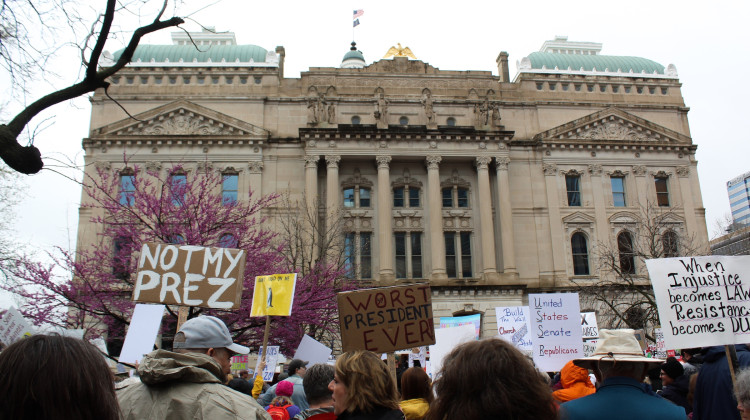
These rectangular holes will eventually be embedded with the cable system designed in Purdue’s lab to charge semi-trucks.
WFYI / Ben ThorpElectric vehicles have long faced a question around adoption — where will drivers stop for the next charge?
Researchers at Purdue University have teamed up with the Indiana Department of Transportation to create a highway that could charge electric vehicles as they pass over it, removing any need to stop.
Steve Pekarek, a lead researcher at Purdue, understands that his vision is a grand one.
“If you can have ubiquitous charging you really reduce the cost of electric vehicles because you reduce the battery size,” Pekarek said. “You reduce the range anxiety so that the adoption rate will likely increase. That’s kind of the overall vision.”
In the laboratory researchers have constructed a way to remotely charge vehicles as they pass over a stretch of highway.
On a long table, Pekarek reveals a series of coils looped together. Above them, in what would be the bottom of a truck, another set of coils are looped in a similar formation.
Pekarek said the receiver underneath the vehicle would charge not unlike a powerful wireless phone charger.
“If you’re talking about how much power is required for a heavy-duty vehicle as it’s moving down the roadway at 65 MPH you’re talking about 200 kilowatts,” he said. “To put that into perspective, you’re talking about the scale of about 100 homes.”
Critics of the pilot project, and other similar pilots, argue that adoption of the technology will be a massive undertaking requiring cars to be redesigned and large infrastructure investments to be made across states.
Pekarek and his team say that’s why they're targeting semi trucks for the technology, arguing that truck fleets will make buy-in easier than for individual personal cars.
“Envision that you’re going from Indianapolis to Columbus, Ohio," Pekarek said. "That’s a large freight traffic roadway. You have to have buy-in on the Indiana state of the line, but you also have to have buy-in in Ohio.”
Testing real roadways
Less than three miles down the road, along a stretch of US-231 just outside of West Lafayette, Indiana construction workers are cutting 7x12-foot rectangles in the concrete as cars roll by.
Those rectangles will eventually be filled with a series of copper wires, which will then be charged by a generator next to the quarter-mile stretch of road, putting ideas from the lab into practice.
Blake Dollier is the public relations director for the Indiana Department of Transportation West Central District. He said he hopes the pilot program can lead to a broader adoption of the technology.
“Being able to have this go well enough here that we use it in other places, that’s something we’re really hoping we’re able to see,” Dollier said. “It’s something we have seen in the lab and now we want to put it into practice.”
Dollier said the project has cost about $11 million — primarily through INDOT research funding.
“Of course, we do want to bring the cost down as much as possible for this project or any project,” he said. “In that case, we would probably look at other options as well.”
By next year researchers hope this quarter-mile stretch of road will be able to start testing. They're looking at things like road wear and tear and the effectiveness of the system during different kinds of weather.
A long road to adoption
Jason Hoffsetz pulls his car into the charging station outside the Fort Ben Public Library branch in Indianapolis. He’s been using electric vehicles for roughly a decade and said range anxiety hasn’t really been a concern for him.
Hoffsetz said he bought his last vehicle in Seattle and drove it to Indianapolis, then took another trip to the east coast the following year.
“So I drove a non-Tesla from West to East coast,” Hoffsetz said. “But it did take some planning, for sure. But every year that planning becomes less and less.”
Hoffsetz likes the idea of what Purdue is doing but feels skeptical about the investment.
“It’ll take a long time to get us to that point,” he said. “I don’t trust our usual roads as it is right now. I say that having blown a tire out just last month on a pothole.”
Contact WBAA/WFYI reporter Benjamin Thorp at bthorp@wfyi.org.
 DONATE
DONATE






 Support WFYI. We can't do it without you.
Support WFYI. We can't do it without you.